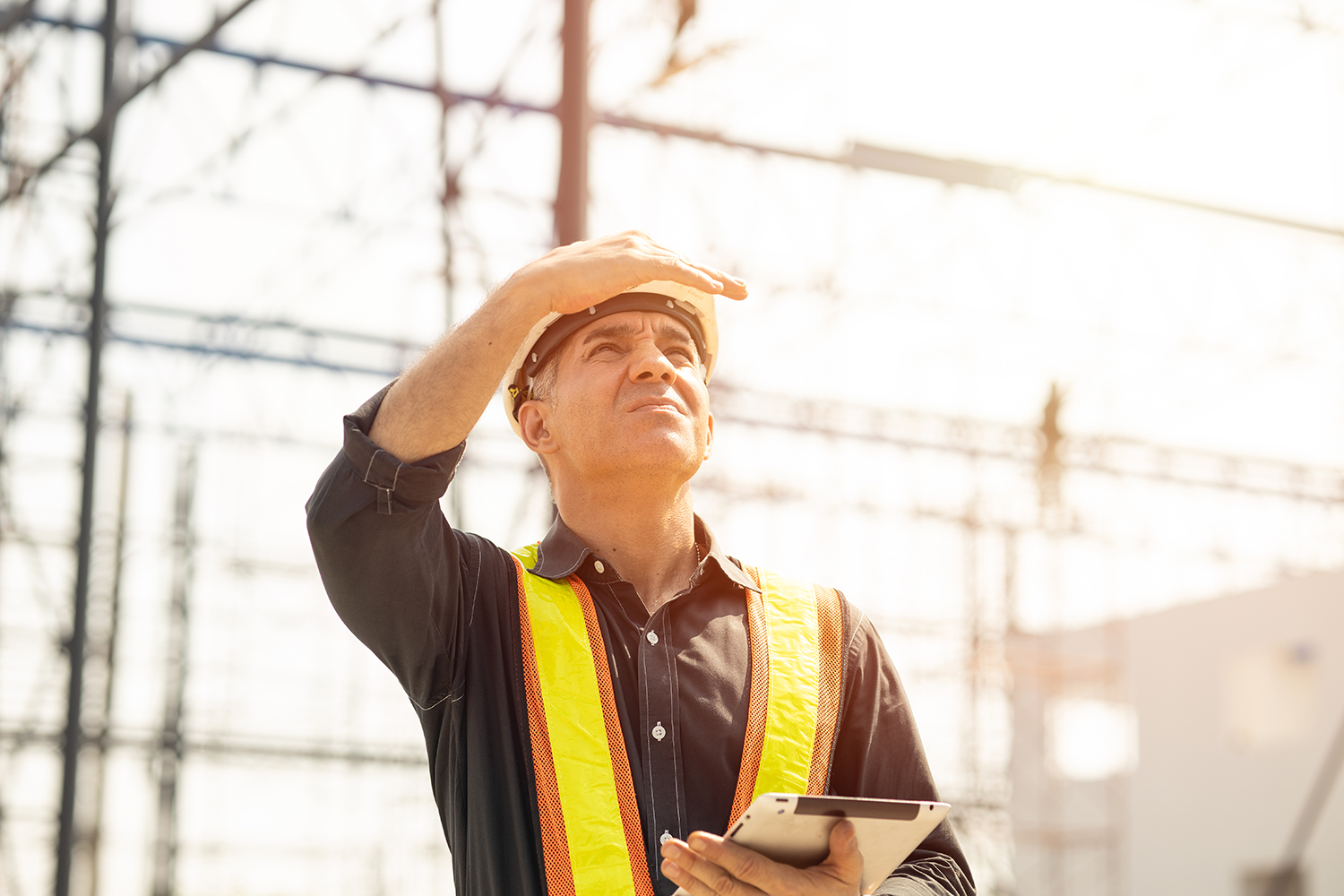Dalkia Completes Decarbonisation Scheme at Arup’s London HQ
The £3.1 million scheme to decarbonise Arup’s headquarters at 8 Fitzroy Street is now complete. Dalkia has delivered the validation, detailed coordination,...
Read Full Article
Risk of heat-related illness among staff, keeping older buildings cool and security concerns from open doors and windows – these are just some of the additional pressures facing FMs and their teams when making our buildings safe and comfortable during a heatwave.
Managing facilities in extreme weather events, such as the recent Red severe weather warning, requires a facilities manager to not only prepare their teams for working in tough conditions but also can expose or exacerbate problems in older or less energy efficient buildings.
BESA said many building owners and managers were reluctant to invest in measures they believed would only have an impact during extreme temperature events on just a few days of the year. They have also been put off by rising material costs, skills shortages, and a failure to see health resilience measures as part of a wider effort to improve building performance.
“The poor performance of our building stock tends to hit the national headlines during periods of extreme heat or cold, but then to drop into the background again,” said BESA’s Head of Technical Graeme Fox. “However, this time feels a bit different. I think the pandemic and the current energy crisis have concentrated minds – so the heatwave has created further momentum for addressing this in a more strategic way.”
ThisWeekinFM spoke to several people working in the FM and built environment space, to find out how they prepare for extreme heat, how they support their teams, and the challenges they experience within the buildings they manage.
Peter Coates, Divisional Director at ABM, explained how the FM’s role is always to take notice of changes and weather, and to be always ready to make changes in light of this:
“We are constantly monitoring the weather to ensure we can adapt processes and plans when required. When we do so, it’s crucial that all relevant comms are received and understood by team members.
“There is increased engagement with front line teams during events and managers must ensure everyone on site is safe and well, regularly. That is the top priority.
"In extreme weather conditions, we review and relax our PPE and uniform guidelines when it is safe to do so. We encourage our teams to wear lighter uniform where possible, for example, combining a t-shirt/hi-viz rather than wearing two layers and when it’s safe to do so, employees can wear shorts instead of trousers.”

Picture: a photograph of Peter Coates. Image Credit: ABM
As with any extreme situation, often the performance of a building can be tested to its limits, leading teams to reflect on how the UK’s commercial building stock can be better equipped to manage these situations.
Oliver Boote, UK Facilities Manager for Mace for Colt, commented that any relatively new and well-maintained system should be able to cool an office environment, minimising downtime in heatwaves:
“Extreme weather definitely makes you more conscious about the performance of the building. We rearranged or moved some training courses that we had pencilled in so we had a full complement of our technical teams on hand should there be any issues. When we are talking about storms, then that is when you really are worried. High winds can dislodge plant equipment on the roof, causing lots of damage and potential health and safety risks.
“Solar-controlled glass is definitely a key part of ensuring that buildings are cool on extremely hot days.”
However, as Seetan Varsani, Director of Major Accounts & Strategic Development at Corps Security explained, a building’s physical features can be significantly affected under extreme weather:
“Lifts and doors can be subject to expansion and contraction via exposure to extreme temperatures. Mechanical elements can be at risk of overheating, so strategies for contingent people guarding as a short-term measure, should be in place in the event of asset failures.”
Steve McGregor, Group MD at DMA Group, a firm of property maintenance specialists, agreed that the age of the building is huge consideration:
“It is much easier in modern commercial buildings, but trickier in some residential blocks where no through ventilation can be achieved. Older commercial buildings can also be difficult where heat can’t be extracted naturally, and this will require mechanical systems to extract the excess heat.
“The Climate Change Committee has been pursuing the need to improve buildings for nearly 10 years. Solar film window coverings, blinds and screens can also play a massive role in reducing deaths and illness to intense heat.”
Phillipa Atkinson-Clow, General Manager of the Water Dispenser & Hydration Association, emphasised the importance of providing sustainable ways of hydrating workforces:
“As the government and others have advised, hydration should be top of the list in extremely hot temperatures. This is one of the prime means of ensuring people are safe. Dehydration can occur quickly in high temperatures and can lead to a host of health problems.
“The good news is that, unless dehydration is extreme, most people have the ability to rehydrate quickly once they notice symptoms. It’s not just during the day that hydration is important. During hot nights, lack of fluid can cause sleeplessness which in turn can lead to careless mistakes the following day due to heat-induced exhaustion. Maintaining good hydration levels throughout the day and evening, is important. In these extremes, that means drinking more than the average recommendation of 1.8 litres of fluid a day.

Picture: a photograph of Phillipa Atkinson-Clow. Image Credit: WHA
“FMs can help by providing safe, sustainable means of hydration through water dispensers. When specifying your dispensers, it’s important to ensure they are WHA-Safe and provided by an accredited member of the Water Dispenser & Hydration Association.”
“In extreme circumstances like intense heat, matters can become unacceptably aggressive. This results in a feeling of ‘even their best isn’t good enough’, which isn’t fair. It’s important to remember that they have families and dependents who are directly affected by the same challenges."
–Steve McGregor
Group MD, DMA Group
Steve McGregor also highlighted the importance of patience and understanding in times of extreme heat. Speaking about the recent heatwave, he said: “It certainly increased demands upon finite teams which in turn increases stress. This might mean there’s an inability to resolve things quicker than we usually could.
“In extreme circumstances like intense heat, matters can become unacceptably aggressive. This results in a feeling of ‘even their best isn’t good enough’, which isn’t fair. It’s important to remember that they have families and dependents who are directly affected by the same challenges.”
Security officers make up some of the most vulnerable parts of the FM workforce during extreme weather, particularly if they work outside.
Seetan Varsani, Director of Major Accounts & Strategic Development at Corps Security, detailed some of the specific challenges for security teams in hot weather:
“For security, staying vigilant and helpful to members of the public, and being ready to act quickly and efficiently can be critical. Extreme heat can cause physical discomfort that can affect an individual’s ability to focus, so it’s important to be aware of the weather forecast and plan where possible.
“Extreme weather conditions, particularly in large cities such as London, attract more public (especially during summer holidays). As such, there’s a heavier reliance on security personnel in playing a part in customer service queries. Large crowds in public spaces and gathering areas, and outdoor drinking and dining sites all attract greater levels of risk due in extreme weather with the influence of alcohol and physical discomfort or dehydration placing further strain on the levels of security required to attend to such issues.

Picture: a photograph of Seetan Varsani. Image Credit: Corps
“Under these conditions, support from electronic equipment like CCTV monitoring systems controlled by Corps Monitoring, for patrols and perimeter checks, can be invaluable – rather than subjecting people-power to external areas. The requirement of such systems, however, should be tested under extreme heat conditions to ensure efficacy.
“With the increased risk of heat related illness among our colleagues who are exposed to excessive heat, there also remains the responsibility to stay conscious of the security of each premises if required to open windows and doors to facilitate airflow.”
Picture: a photograph of a person wearing a hard hard and high vis jacket holding their hand near their head to block out sunshine. Image Credit: Shutterstock
Article written by Ella Tansley | Published 19 July 2022
The £3.1 million scheme to decarbonise Arup’s headquarters at 8 Fitzroy Street is now complete. Dalkia has delivered the validation, detailed coordination,...
Read Full ArticleAs deaths due to excess heat increase, the Building Engineering Services Association is calling for more concerted efforts to adapt the built environment’s...
Read Full ArticleSaltire Facilities Management, one of the largest gas central heating and electrical firms in Scotland, has been acquired for an undisclosed sum by Daikin Airconditioning...
Read Full ArticleThe Chartered Institution of Building Services Engineers has launched its latest weather data set to assist building services professionals in adapting their...
Read Full ArticleLuke Gorman from ABM explores the impact of HVAC on the environment and how facilities management now functions as a strategic ESG partner. Luke graduated from...
Read Full ArticleA smart sensor trial at Transport for London’s Stratford office is predicted to cut 40 tonnes of carbon dioxide emissions annually. The year-long pilot, a...
Read Full ArticleCBFM, the Northeast-based HVAC specialist, has completed the installation of 4 x 800 litre indirect cylinders with destratification pumps at Cassaton House in...
Read Full ArticleCBFM, a long-established Northeast firm specialist in commercial HVAC design, air conditioning installation, maintenance and servicing along with facilities and buildings...
Read Full ArticleFujitsu has agreed to sell its air conditioning arm to Paloma Rheem Holdings. IT firm Fujitsu will transfer its 44 per cent stake in Fujitsu General for a total...
Read Full ArticlePainting roofs white or using reflective coatings is more effective at cooling cities compared to green roofs, street vegetation, or solar panels, according to UCL...
Read Full Article